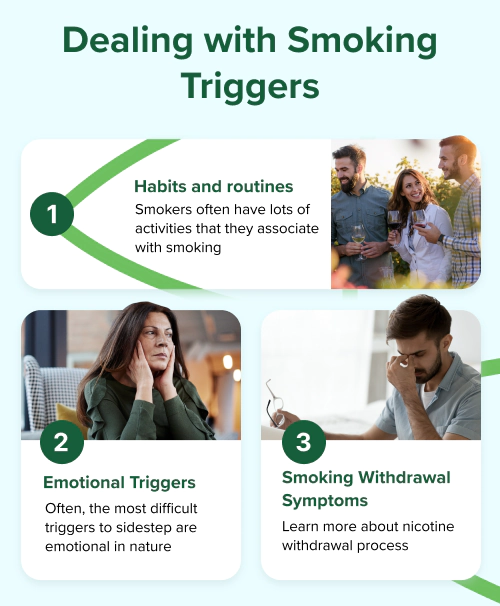Most smokers have triggers. Learning to recognise them is one of the most important steps on the road to stopping for good.
“Triggers” are actions or events that make you crave a cigarette. They’re the moments that you associate most closely with smoking – and whether it’s drinking a cup of coffee, finishing a meal, or drinking alcohol, most smokers have them.
Learning to recognise your triggers is an important step on the road to becoming smoke-free. Once you start to notice and understand your own personal triggers, you can start to come up with strategies to beat them.

Habits and routines
Smokers often have lots of activities that they associate with smoking. These are generally parts of your daily routine, and in some cases may need to be changed or even stopped for a while.
Some of the most common “pattern triggers” include:
Drinking alcohol or coffee
Finishing a meal
Watching TV
Driving
Talking on the phone
When attempting to quit, it can be helpful to avoid your triggers when getting through the initial stages of nicotine withdrawal. For instance, in the first few weeks after quitting, it can be helpful to avoid places where people tend to smoke. Similarly, if coffee is a major trigger, consider drinking tea or decaf as an alternative.
Of course, you can’t avoid every common trigger. For triggers like finishing a meal or driving, the key is to break the association between the event and smoking. Helpful strategies for this include finding a physical replacement for smoking, like chewing gum or sucking on a lozenge or mint. For others, it can be beneficial to go for a walk or distract yourself by doodling or squeezing a stress ball to keep your hands busy.

Emotional Triggers
Some triggers are easier to plan for than others. Often, the most difficult triggers to sidestep are emotional in nature, and can range from experiencing stress and anxiety to feeling happy and satisfied.
When faced with an intense emotion that would normally cause you to smoke, you can try one of a number of other techniques for relaxation. One such strategy is to simply take slow, deep breaths. Another is to talk through your emotions with a friend or family member. Exercise can also help with emotional triggers in much the same way as it can with pattern triggers.
Smoking Withdrawal Symptoms
Another group of triggers are those related to the nicotine withdrawal process. These can take the form of craving a cigarette, increased appetite, or simply feeling anxious and irritable.
If you are struggling with triggers like these, it could be worth trying Nicotine Replacement Therapy (NRT). NRT releases small amounts of nicotine into the bloodstream, helping to satisfy cravings and ease other unpleasant withdrawal symptoms. To learn more, read our guide to NRT and other quitting methods here.




